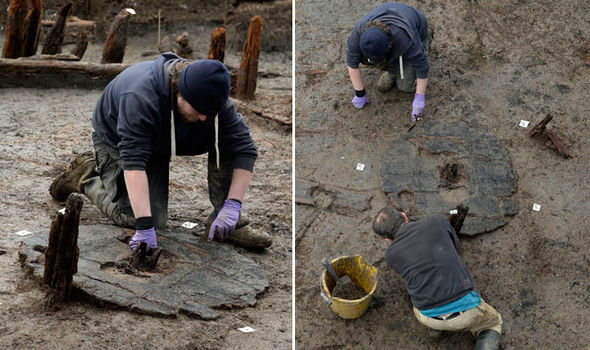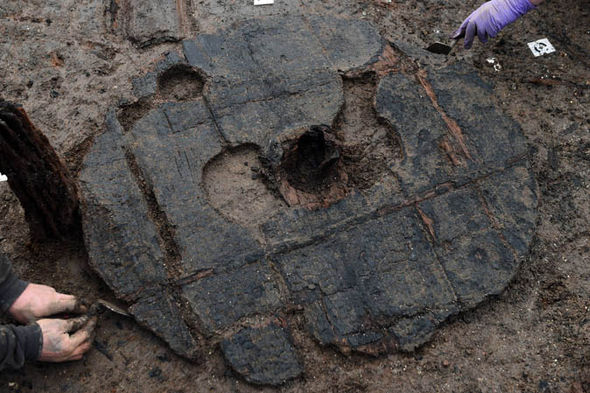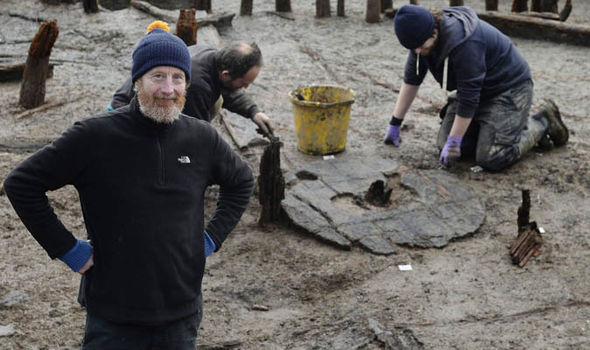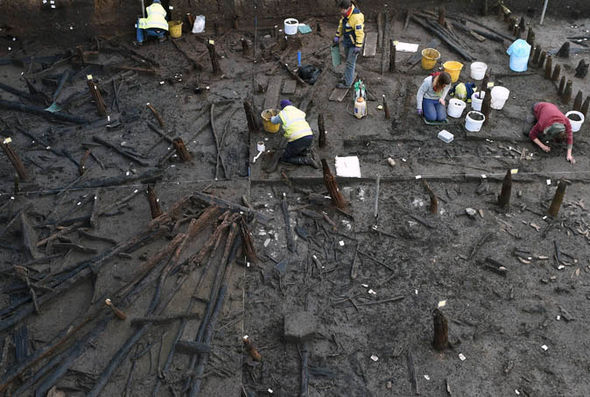Bronze Age wheel found at ‘Britain’s pompei’ for the first time EVER

A COMPLETE wheel from the Bronze Age has been discovered in Britain for the first time.
A dig at the edge of a brick quarry near Peterborough, Cambridgeshire, has already drawn comparisons with the Roman city Pompeii — because it provides a time capsule into Bronze Age life, just as the era was ending.
Dwellings discovered at Must Farm quarry, Whittlesey, in the East Anglian fens, were built on stilts on a river and destroyed in a fire 3,000 years ago.
Now among the water and silt which has preserved countless artefacts, the team has found a wheel thought to date from 1100-800 BC.
It helps build a picture of the settlement as a thriving community with strong trade links with neighbours on dry land.
Before today only two other Bronze Age wheels had been found in England and these were in fragments
Mark Knight, site director
Duncan Wilson, chief executive of Historic England, said: "This remarkable but fragile wooden wheel is the earliest complete example ever found in Britain.
"The existence of this wheel expands our understanding of Late Bronze Age technology and the level of sophistication of the lives of people living on the edge of the Fens 3,000 years ago."
The ancient wooden wheel is one metre in diameter and is so well preserved it still contains part of the axle.
Historic England said the find is unprecedented in terms of size and completeness.
The oldest Bronze Age wheel ever found in Britain was found at nearby Flag Fen and dates to 1300 BC, but this is incomplete and much smaller.
Mark Knight, site director of the excavation, said that combined with other finds at Must Farm, the discovery helps provide an extraordinary insight into domestic life 3,000 years ago.
He said: "Before today only two other Bronze Age wheels had been found in England and these were in fragments.
"Another intact wheel originally thought to be a shield has been found in Scotland, but that's it for this kind of technology."
He said that other evidence revealing the people lived off a diet of lamb, pork, beef, barley and wheat showed the inhabitants of the river community had links with other communities on dry land.
"We can tell these people were thriving," he added.
"They were not bog dwellers nor were they on the edge of their world, they were at the centre of it.
"This was a planned settlement with the wood used for its construction coming from managed woodland.
"This tells me this is not a one-off and there are more of these settlements along these lines.
"This was the beginning of colonisation and these finds are the first glimpse of a lost world."
The dig has already revealed circular wooden houses believed to be the best-preserved Bronze Age dwellings ever found in Britain.
The large wheel was unearthed just a few metres away from the largest round house on the site.
Other exciting finds include a wooden platter, small wooden box and rare small bowls and jars with food remains inside, as well as exceptional textiles and Bronze Age tools.
The houses eventually collapsed into a river, after a catastrophic fire, which preserved their contents in amazing detail.
Historic England and building products supplier Forterra are funding a major £1.1 million project to excavate 1,100 square metres of the Must Farm quarry site.
The Cambridge Archaeological Unit is more than half way through the excavation, which is taking place because of concerns about the future preservation of the site.
The remains cannot be preserved indefinitely in situ and need to be recorded and analysed to help our understanding of the unique Bronze Age site.
After the excavation is finished, the team will take the finds for further analysis and conservation. Eventually, they will be displayed at Peterborough Museum, Flag Fen and at other local venues.
Политика конфиденциальности | Правила пользования сайтом










